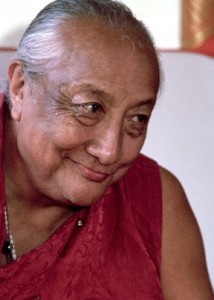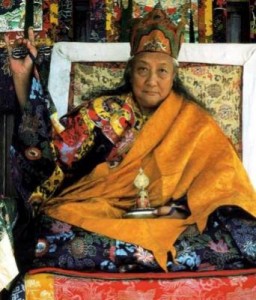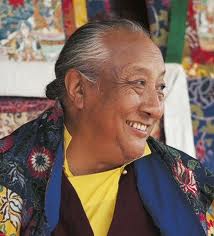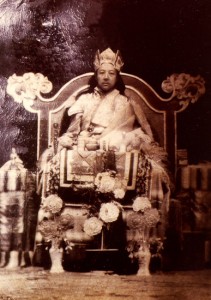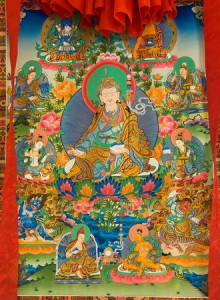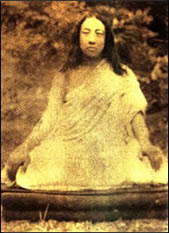
The following is respectfully quoted from “Journey to Enlightenment” by Dilgo Khyentse Rinpoche:
Though you perfected the qualities of the three kayas,
In order to liberate beings of the impure realms
You manifested as a supreme renunciate;
Lord Pema Vijaya, I miss you from the depth of my heart.
The feeling that this precious support, a free and blessed human body,
Will be lost to the enemy, the bandit Lord of Death,
Overwhelms my mind with anguish,
Like a frightened little bird falling to the ground.
The abyss of the lower realms is hard to fathom, and
This present comfort and happiness in the higher realms
Is like a rainbow in the sky that’s about to vanish;
Remember the spreading, dense rain clouds of wrongdoing!
A delightful palace may be magnificent,
But it can’t guard against fear of the Lord of Death!
All food and drink may taste delicious,
But they might become the cause of drinking melted copper!
No matter how much I cherish this body covered in soft clothes,
It’s uncertain when it will start to smell like a rotten corpse,
A handsome, youthful body may gladden my heart, but
When the eyes dissolve into the skull, it’s useless.
My shiny jewelry may be a charming object,
But it can’t seduce the wrathful grimacing Lord of Death;
Though my fame may pervade the whole country,
It won’t help me when body and mind separate!
Though prestige and power may frighten everyone,
They won’t protect me when going alone;
A powerful rank and status may be impressive,
But it’s impossible to avoid the Lord of Death’s court of law!
Large crowds of people are the cause of likes and dislikes;
By the time I go to the bardo I’ll be alone.
Remaining far away from the affairs of this life,
I’ll stay alone in a secluded, rocky shelter!
Living like a wounded deer,
My heart’s desire is to watch the snow of mind within;
All past siddhas stayed in remote rocky mountains too,
Capturing the kingdom of experience and realization.
Remembering the life story of Milarepa,
When I’m hungry I’ll eat the food of samadhi,
When I’m cold I’ll wear cloth of mystic inner heat;
In the company of birds and wild animals,
I’m going to cloudy, mist-shrouded mountains!
In a cave that’s not altered by people,
Nourished by leaves that need no cultivation,
Drinking the clear and cool water from rocks,
My heart’s wish is to just be with mountain birds.
In the cool shade of excellent trees,
In a relaxed and carefree state of mind,
With the cool shelter of a fresh breeze, my health will be good;
All by myself, my activities will be in accord with the Dharma!
On the summit of high rock in the immense sky,
Developing strength in realization of aware emptiness within,
When rays of the smiling sun and moon above reach my heart,
I enter the inner space of the six lamps of space and awareness.
Sometimes clouds and mist appear,
Thunder and red lightening flash like a playful dance,
Roaring wind swirls around black clouds,
Reflecting the sounds, lights, and rays in the threatening bardo.
In the pure meadow, around gently moving water,
My companions, young wild sheep, play and climb the rocks;
Sweetly singing, shiny blackbirds develop strength in flying,
And white vultures circle around at leisure.
Except for the mother dakinis that gather here,
Wicked people never pass by;
The vast expanse of a blue lake full to the brim
Indicates the four modes of freely resting awareness within.
The company of small swans,
Sweetly singing and training their wings,
Reminds me of practicing the different types of loving-kindness;
In my estate of this empty valley,
Relying on the pure, cool water from snow mountains,
I’m going to capture the kingdom of experience and realization!
I decided that from now on I don’t need anything;
The countless joys and sorrows of this life,
Whatever I experienced in the past, are like drawing on water.
Except for accumulating habitual tendencies for samsara’s depth,
Look at this present body to see if there was any benefit or not!
With hope and fear of making a living for the future,
Life runs out with a stock of karmic activity;
The very moment one is captured by the foe, Yama’s rope,
Reflect on whether it is any use when you exhale your final breath!
Though I am naive and immature,
As my father, the Dharma lord Lama Gyaltsap,
Let his blessings enter my heart, I conceived the urge to escape
And see activities for this life as confusion.
Unable to bear that all-consuming thought, the urge to escape,
I wrote it down as it slipped from my mouth;
Though thoughts in an ordinary person’s mind are impermanent,
Bless me to be free of adversity and obstacles.
With the root of all Dharma, renunciation,
Steadfast like an engraved rock,
May I become like the protector Pema Vijaya,
The master of nonaction, yogi of the sky!
